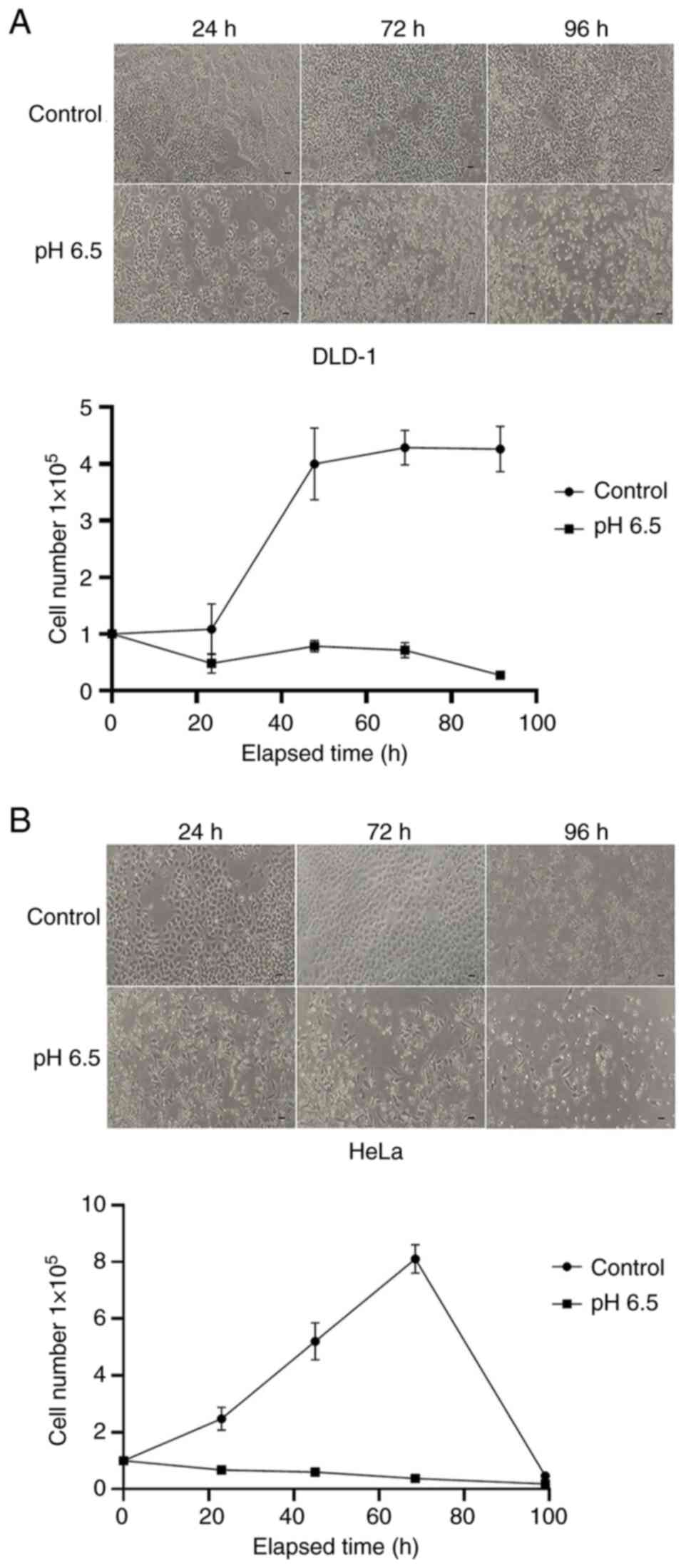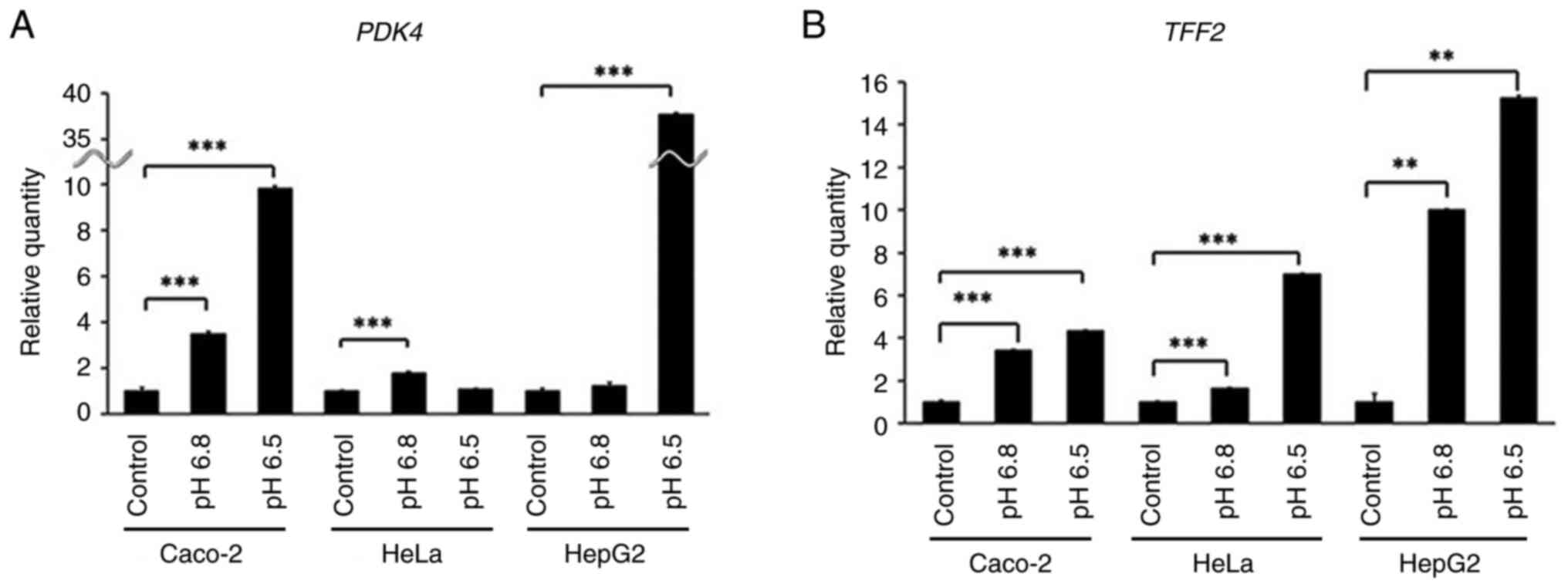|
1
|
Fujimoto K, Fujii G, Taguchi K, Yasuda K,
Matsuo Y, Hashiyama A, Mutoh M, Tanaka H and Wada M: Involvement of
trefoil factor family 2 in the enlargement of intestinal tumors in
Apc(Min/+) mice. Biochem Biophys Res Commun. 463:859–863. 2015.
View Article : Google Scholar : PubMed/NCBI
|
|
2
|
Ma X, Yuan W and Ma J: Expression level of
miR-199b in human colorectal cancer tissues and its correlation
with clinicopathological features and prognosis of patients.
Zhonghua Zhong Liu Za Zhi. 45:330–334. 2023.(In Chinese).
PubMed/NCBI
|
|
3
|
Qu Y, Yang Y, Ma D and Xiao W: Increased
trefoil factor 3 levels in the serum of patients with three major
histological subtypes of lung cancer. Oncol Rep. 27:1277–1283.
2012. View Article : Google Scholar : PubMed/NCBI
|
|
4
|
Minegishi K, Dobashi Y, Koyama T,
Ishibashi Y, Furuya M, Tsubochi H, Ohmoto Y, Yasuda T and Nomura S:
Diagnostic utility of trefoil factor families for the early
detection of lung cancer and their correlation with tissue
expression. Oncol Lett. 25:1392023. View Article : Google Scholar : PubMed/NCBI
|
|
5
|
Aihara E, Engevik KA and Montrose MH:
Trefoil factor peptides and gastrointestinal function. Annu Rev
Physiol. 79:357–380. 2017. View Article : Google Scholar : PubMed/NCBI
|
|
6
|
Guo M, Wang R, Geng J, Li Z and Liu M, Lu
X, Wei J and Liu M: Human TFF2-Fc fusion protein alleviates
DSS-induced ulcerative colitis in C57BL/6 mice by promoting
intestinal epithelial cells repair and inhibiting macrophage
inflammation. Inflammopharmacology. 3:1387–1404. 2023. View Article : Google Scholar : PubMed/NCBI
|
|
7
|
Kosriwong K, Menheniott TR, Giraud AS,
Jearanaikoon P, Sripa B and Limpaiboon T: Trefoil factors: Tumor
progression markers and mitogens via EGFR/MAPK activation in
cholangiocarcinoma. World J Gastroenterol. 17:1631–1641. 2011.
View Article : Google Scholar : PubMed/NCBI
|
|
8
|
Jahan R, Ganguly K, Smith LM, Atri P,
Carmicheal J, Sheinin Y, Rachagani S, Natarajan G, Brand RE, Macha
MA, et al: Trefoil factor(s) and CA19.9: A promising panel for
early detection of pancreatic cancer. EBioMedicene. 42:375–385.
2019. View Article : Google Scholar
|
|
9
|
Asaka S, Nakajima T, Momose M, Miyamoto T,
Uehara T and Ota H: Trefoil factor family 2 protein: A potential
immunohistochemical marker for aiding diagnosis of lobular
endocervical glandular hyperplasia and gastric-type adenocarcinoma
of the uterine cervix. Virchows Arch. 474:79–86. 2019. View Article : Google Scholar : PubMed/NCBI
|
|
10
|
Jahan R, Shah A, Kisling SG, Macha MA,
Thayer S, Batra SK and Kaur S: Odyssey of trefoil factors in
cancer: Diagnostic and therapeutic implications. Biochim Biophys
Acta Rev Cancer. 1873:1883622020. View Article : Google Scholar : PubMed/NCBI
|
|
11
|
Zhang Y, Liu Y, Wang L and Song H: The
expression and role of trefoil factors in human tumors. Transl
Cancer Res. 8:1609–1617. 2019. View Article : Google Scholar : PubMed/NCBI
|
|
12
|
So JY, Ohm J, Lipkowitz S and Yang L:
Triple negative breast cancer (TNBC): Non-genetic tumor
heterogeneity and immune microenvironment: Emerging treatment
options. Pharmacol Ther. 237:1082532022. View Article : Google Scholar : PubMed/NCBI
|
|
13
|
Funato Y, Yoshida A, Hirata Y, Hashizume
O, Yamazaki D and Miki H: The oncogenic PRL protein causes acid
addiction of cells by stimulating lysosomal exocytosis. Dev Cell.
55:387–397.e8. 2020. View Article : Google Scholar : PubMed/NCBI
|
|
14
|
Pentheroudakis G, Kotoula V, Fountzilas E,
Kouvatseas G, Basdanis G, Xanthakis I, Makatsoris T, Charalambous
E, Papamichael D, Samantas E, et al: A study of gene expression
markers for predictive significance for bevacizumab benefit in
patients with metastatic colon cancer: A translational research
study of the Hellenic Cooperative Oncology Group (HeCOG). BMC
Cancer. 14:1112014. View Article : Google Scholar : PubMed/NCBI
|
|
15
|
Otsuka K, Yamamoto Y and Ochiya T:
Uncovering temperature-dependent extracellular vesicle secretion in
breast cancer. J Extracell Vesicles. 10:e120492020. View Article : Google Scholar : PubMed/NCBI
|
|
16
|
Pitt MA: Increased temperature and entropy
production in cancer: The role of anti-inflammatory drugs.
Inflammopharmacology. 23:17–20. 2015. View Article : Google Scholar : PubMed/NCBI
|
|
17
|
Livak KJ and Schmittgen TD: Analysis of
relative gene expression data using real-time quantitative PCR and
the 2(−Delta C(T)) method. Mehtods. 25:402–408. 2001.PubMed/NCBI
|
|
18
|
Miyahara E, Nishikawa T, Takeuchi T,
Yasuda K, Okamoto Y, Kawano Y and Horiuchi M: Effect of
myeloperoxidase inhibition on gene expression profiles in HL-60
cells exposed to 1,2,4-benzenetriol. Toxicology. 317:50–57. 2014.
View Article : Google Scholar : PubMed/NCBI
|
|
19
|
Landry J, Bernier D, Chrétien P, Nicole
LM, Tanguay RM and Marceau N: Synthesis and degradation of heat
shock proteins during development and decay of thermotolerance.
Cancer Res. 42:2457–2461. 1982.PubMed/NCBI
|
|
20
|
Pettersen IKN, Tusubira D, Ashrafi H,
Dyrstad SE, Hansen L, Liu XZ, Nilsson LIH, Løvsletten NG, Berge K,
Wergedahl H, et al: Upregulated PDK4 expression is a sensitive
marker of increased fatty acid oxidation. Mitochondrion. 49:97–110.
2019. View Article : Google Scholar : PubMed/NCBI
|
|
21
|
Hoffmann W: Trefoil factor family (TFF)
peptides and their diverse molecular functions in mucus barrier
protection and more: Changing the paradigm. Int J Mol Sci.
21:45352020. View Article : Google Scholar : PubMed/NCBI
|
|
22
|
Ishibashi Y, Ohtsu H, Ikemura M, Kikuchi
Y, Niwa T, Nishioka K, Uchida Y, Miura H, Aikou S, Gunji T, et al:
Serum TFF1 and TFF3 but not TFF2 are higher in women with breast
cancer in women without breast cancer. Sci Rep. 7:48462017.
View Article : Google Scholar : PubMed/NCBI
|
|
23
|
Nogueira-Librelotto DR, Scheeren LE,
Macedo LB, Vinardell MP and Rolim CMB: pH-sensitive
chitosan-tripolyphoshate nanoparticles increase doxorubicin-induced
growth inhibition of cervical HeLa tumor cells by apoptosis and
cell cycle modulation. Colloids Surf B Biointerfaces.
190:1108972020. View Article : Google Scholar : PubMed/NCBI
|
|
24
|
Szlase W, Zendran I, Zalesińska A, Tarek M
and Kulbacka J: Lipid composition of the cancer cell membrane. J
Bioenerg Biomembr. 52:321–342. 2020. View Article : Google Scholar : PubMed/NCBI
|
|
25
|
Yu G, Jiang P, Xiang Y and Zhang Y, Zhu Z,
Zhang C, Lee S, Lee W and Zhang Y: Increased expression of
protease-activated receptor 4 and trefoil factor 2 in human
colorectal cancer. PLoS One. 10:e01226782015. View Article : Google Scholar : PubMed/NCBI
|
|
26
|
Gala MK, Austin T, Ogino S and Chan AT:
TFF2-CXCR4 axis is associated with BRAF V600E colon cancer. Cancer
Prev Res. 8:614–619. 2015. View Article : Google Scholar : PubMed/NCBI
|
|
27
|
Hoffmann W: Trefoil factor family (TFF)
peptides and their different roles in the mucosal innate immune
defense and more: An update. Curr Med Chem. 28:7387–7399. 2021.
View Article : Google Scholar : PubMed/NCBI
|
|
28
|
Järvå MA, Lingford JP, John A, Soler NM,
Scott NE and Goddard-Borger ED: Trefoil factors share a lectin
activity that defines their role in mucus. Nat Commun. 11:22652020.
View Article : Google Scholar : PubMed/NCBI
|
|
29
|
Wu C, Zhang J, Wang M, Du G and Chen J:
Lactobacillus casei combats acid stress by maintaining cell
membrane functionality. J Ind Microbiol Biotechnol. 39:1031–1039.
2012. View Article : Google Scholar : PubMed/NCBI
|
|
30
|
Guan N and Liu L: Microbial response to
acid stress: Mechanisms and applications. Appl Microbiol
Biotechnol. 104:51–65. 2020. View Article : Google Scholar : PubMed/NCBI
|




















